Analysis of Corporations Law Case: ASIC v Fortescue Metals Group Ltd
VerifiedAdded on 2021/05/27
|6
|1175
|57
Case Study
AI Summary
This case study analyzes the Australian Securities and Investments Commission (ASIC) v Fortescue Metals Group Ltd case, focusing on breaches of directors' duties under the Corporations Act 2001. The case revolves around framework agreements between Fortescue and Chinese companies, and whether the company engaged in misleading and deceptive conduct and breached its duty of continuous disclosure. The Federal Court found Fortescue and its director, Mr. Forrest, in breach of the law, but the High Court later overturned the misleading conduct finding while upholding the continuous disclosure breach. The analysis explores the legal implications of the rulings, particularly regarding the interpretation of continuous disclosure obligations and director's responsibilities, and examines the court's reasoning on the enforceability of the agreements and the burden of proof. This case study provides a comprehensive overview of the legal arguments, court decisions, and the implications for corporate governance and disclosure requirements under Australian law.
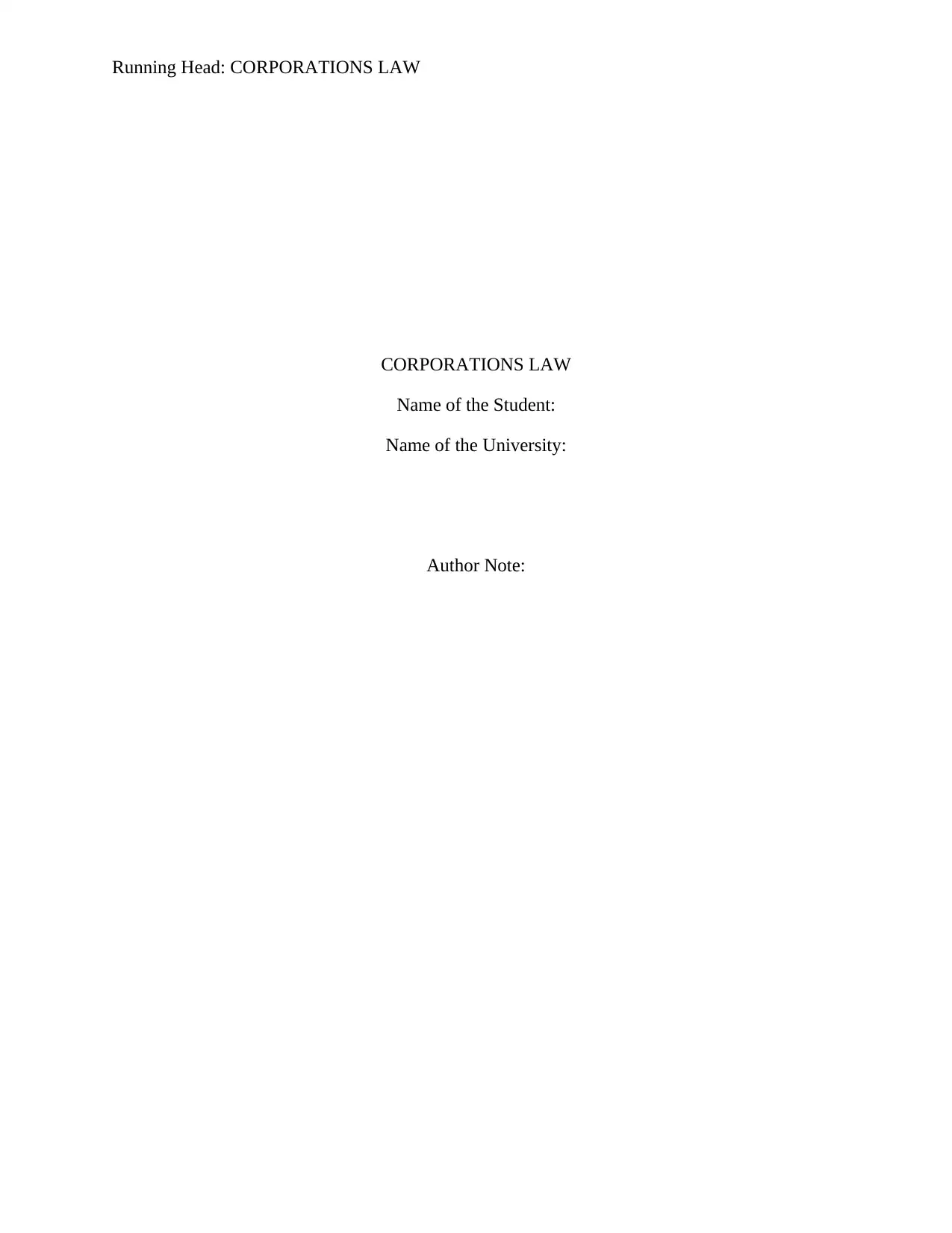
Running Head: CORPORATIONS LAW
CORPORATIONS LAW
Name of the Student:
Name of the University:
Author Note:
CORPORATIONS LAW
Name of the Student:
Name of the University:
Author Note:
Paraphrase This Document
Need a fresh take? Get an instant paraphrase of this document with our AI Paraphraser
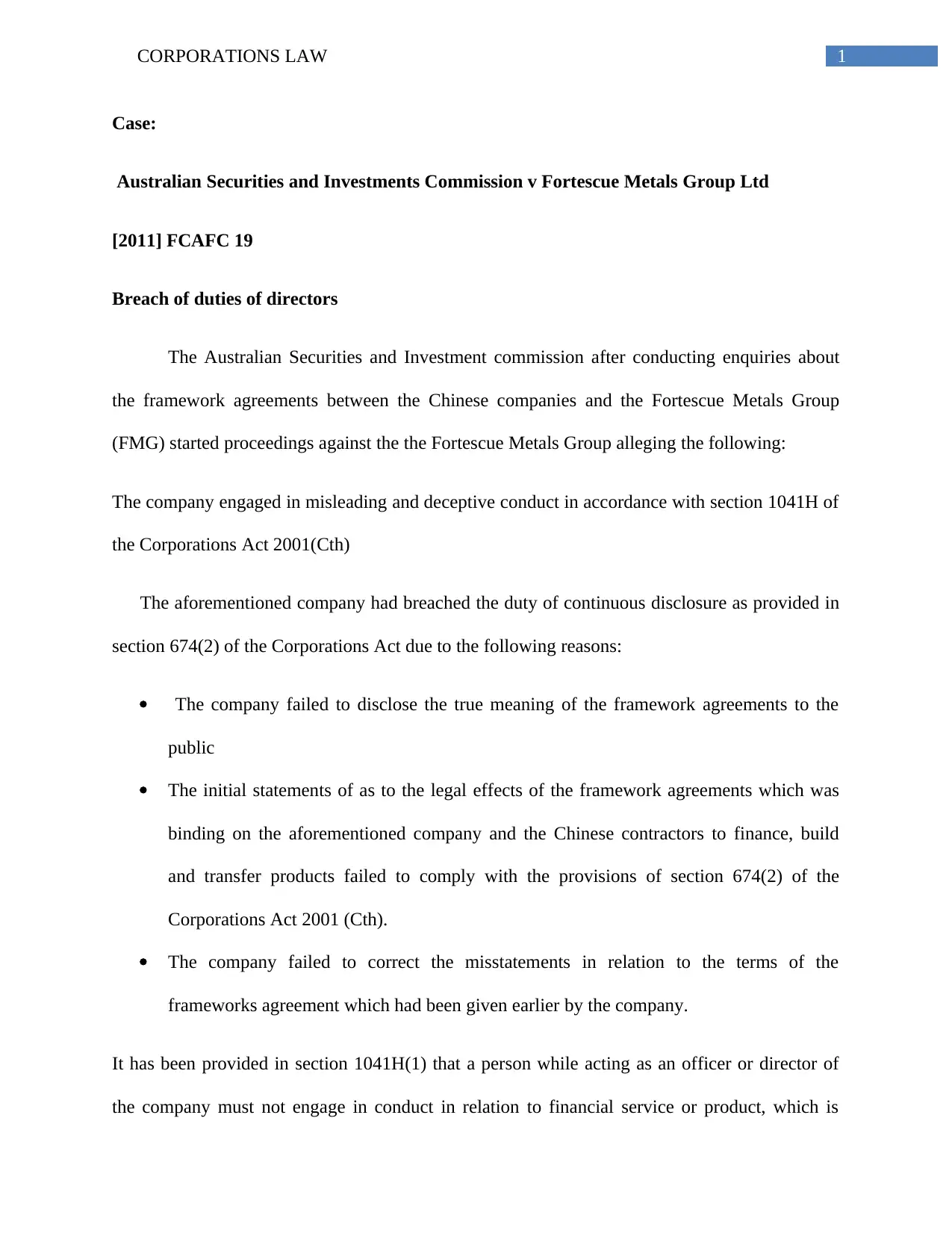
1CORPORATIONS LAW
Case:
Australian Securities and Investments Commission v Fortescue Metals Group Ltd
[2011] FCAFC 19
Breach of duties of directors
The Australian Securities and Investment commission after conducting enquiries about
the framework agreements between the Chinese companies and the Fortescue Metals Group
(FMG) started proceedings against the the Fortescue Metals Group alleging the following:
The company engaged in misleading and deceptive conduct in accordance with section 1041H of
the Corporations Act 2001(Cth)
The aforementioned company had breached the duty of continuous disclosure as provided in
section 674(2) of the Corporations Act due to the following reasons:
The company failed to disclose the true meaning of the framework agreements to the
public
The initial statements of as to the legal effects of the framework agreements which was
binding on the aforementioned company and the Chinese contractors to finance, build
and transfer products failed to comply with the provisions of section 674(2) of the
Corporations Act 2001 (Cth).
The company failed to correct the misstatements in relation to the terms of the
frameworks agreement which had been given earlier by the company.
It has been provided in section 1041H(1) that a person while acting as an officer or director of
the company must not engage in conduct in relation to financial service or product, which is
Case:
Australian Securities and Investments Commission v Fortescue Metals Group Ltd
[2011] FCAFC 19
Breach of duties of directors
The Australian Securities and Investment commission after conducting enquiries about
the framework agreements between the Chinese companies and the Fortescue Metals Group
(FMG) started proceedings against the the Fortescue Metals Group alleging the following:
The company engaged in misleading and deceptive conduct in accordance with section 1041H of
the Corporations Act 2001(Cth)
The aforementioned company had breached the duty of continuous disclosure as provided in
section 674(2) of the Corporations Act due to the following reasons:
The company failed to disclose the true meaning of the framework agreements to the
public
The initial statements of as to the legal effects of the framework agreements which was
binding on the aforementioned company and the Chinese contractors to finance, build
and transfer products failed to comply with the provisions of section 674(2) of the
Corporations Act 2001 (Cth).
The company failed to correct the misstatements in relation to the terms of the
frameworks agreement which had been given earlier by the company.
It has been provided in section 1041H(1) that a person while acting as an officer or director of
the company must not engage in conduct in relation to financial service or product, which is
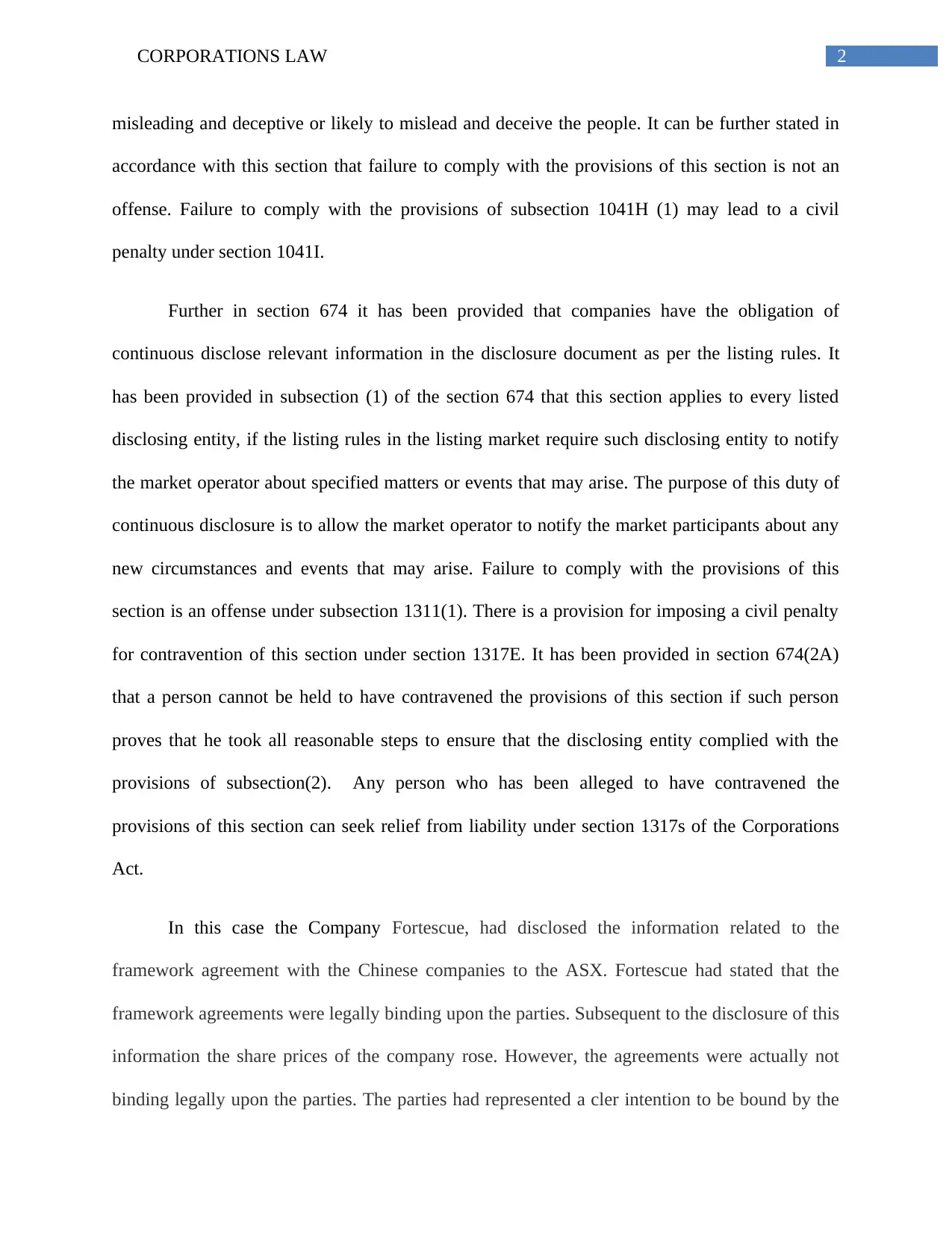
2CORPORATIONS LAW
misleading and deceptive or likely to mislead and deceive the people. It can be further stated in
accordance with this section that failure to comply with the provisions of this section is not an
offense. Failure to comply with the provisions of subsection 1041H (1) may lead to a civil
penalty under section 1041I.
Further in section 674 it has been provided that companies have the obligation of
continuous disclose relevant information in the disclosure document as per the listing rules. It
has been provided in subsection (1) of the section 674 that this section applies to every listed
disclosing entity, if the listing rules in the listing market require such disclosing entity to notify
the market operator about specified matters or events that may arise. The purpose of this duty of
continuous disclosure is to allow the market operator to notify the market participants about any
new circumstances and events that may arise. Failure to comply with the provisions of this
section is an offense under subsection 1311(1). There is a provision for imposing a civil penalty
for contravention of this section under section 1317E. It has been provided in section 674(2A)
that a person cannot be held to have contravened the provisions of this section if such person
proves that he took all reasonable steps to ensure that the disclosing entity complied with the
provisions of subsection(2). Any person who has been alleged to have contravened the
provisions of this section can seek relief from liability under section 1317s of the Corporations
Act.
In this case the Company Fortescue, had disclosed the information related to the
framework agreement with the Chinese companies to the ASX. Fortescue had stated that the
framework agreements were legally binding upon the parties. Subsequent to the disclosure of this
information the share prices of the company rose. However, the agreements were actually not
binding legally upon the parties. The parties had represented a cler intention to be bound by the
misleading and deceptive or likely to mislead and deceive the people. It can be further stated in
accordance with this section that failure to comply with the provisions of this section is not an
offense. Failure to comply with the provisions of subsection 1041H (1) may lead to a civil
penalty under section 1041I.
Further in section 674 it has been provided that companies have the obligation of
continuous disclose relevant information in the disclosure document as per the listing rules. It
has been provided in subsection (1) of the section 674 that this section applies to every listed
disclosing entity, if the listing rules in the listing market require such disclosing entity to notify
the market operator about specified matters or events that may arise. The purpose of this duty of
continuous disclosure is to allow the market operator to notify the market participants about any
new circumstances and events that may arise. Failure to comply with the provisions of this
section is an offense under subsection 1311(1). There is a provision for imposing a civil penalty
for contravention of this section under section 1317E. It has been provided in section 674(2A)
that a person cannot be held to have contravened the provisions of this section if such person
proves that he took all reasonable steps to ensure that the disclosing entity complied with the
provisions of subsection(2). Any person who has been alleged to have contravened the
provisions of this section can seek relief from liability under section 1317s of the Corporations
Act.
In this case the Company Fortescue, had disclosed the information related to the
framework agreement with the Chinese companies to the ASX. Fortescue had stated that the
framework agreements were legally binding upon the parties. Subsequent to the disclosure of this
information the share prices of the company rose. However, the agreements were actually not
binding legally upon the parties. The parties had represented a cler intention to be bound by the
⊘ This is a preview!⊘
Do you want full access?
Subscribe today to unlock all pages.

Trusted by 1+ million students worldwide
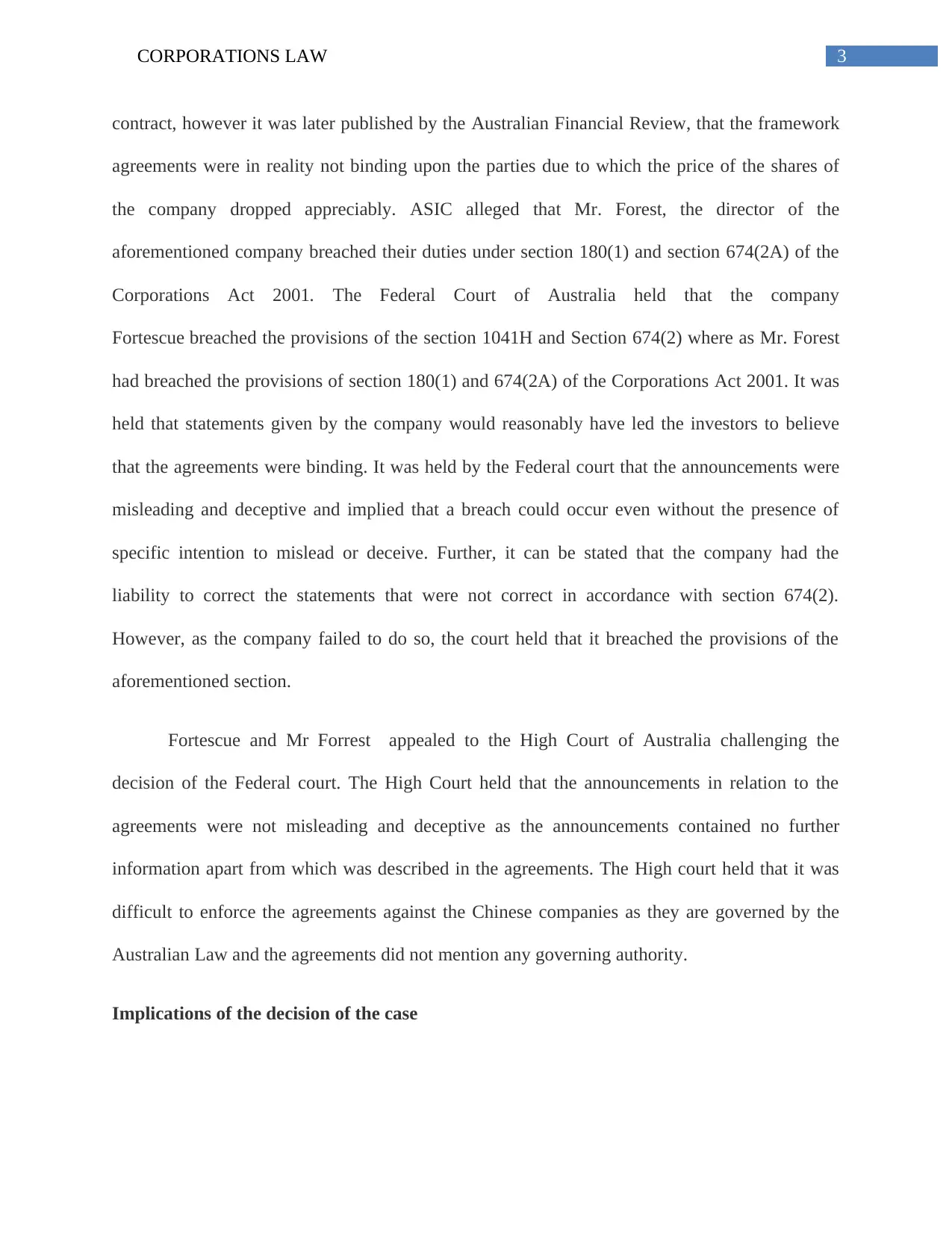
3CORPORATIONS LAW
contract, however it was later published by the Australian Financial Review, that the framework
agreements were in reality not binding upon the parties due to which the price of the shares of
the company dropped appreciably. ASIC alleged that Mr. Forest, the director of the
aforementioned company breached their duties under section 180(1) and section 674(2A) of the
Corporations Act 2001. The Federal Court of Australia held that the company
Fortescue breached the provisions of the section 1041H and Section 674(2) where as Mr. Forest
had breached the provisions of section 180(1) and 674(2A) of the Corporations Act 2001. It was
held that statements given by the company would reasonably have led the investors to believe
that the agreements were binding. It was held by the Federal court that the announcements were
misleading and deceptive and implied that a breach could occur even without the presence of
specific intention to mislead or deceive. Further, it can be stated that the company had the
liability to correct the statements that were not correct in accordance with section 674(2).
However, as the company failed to do so, the court held that it breached the provisions of the
aforementioned section.
Fortescue and Mr Forrest appealed to the High Court of Australia challenging the
decision of the Federal court. The High Court held that the announcements in relation to the
agreements were not misleading and deceptive as the announcements contained no further
information apart from which was described in the agreements. The High court held that it was
difficult to enforce the agreements against the Chinese companies as they are governed by the
Australian Law and the agreements did not mention any governing authority.
Implications of the decision of the case
contract, however it was later published by the Australian Financial Review, that the framework
agreements were in reality not binding upon the parties due to which the price of the shares of
the company dropped appreciably. ASIC alleged that Mr. Forest, the director of the
aforementioned company breached their duties under section 180(1) and section 674(2A) of the
Corporations Act 2001. The Federal Court of Australia held that the company
Fortescue breached the provisions of the section 1041H and Section 674(2) where as Mr. Forest
had breached the provisions of section 180(1) and 674(2A) of the Corporations Act 2001. It was
held that statements given by the company would reasonably have led the investors to believe
that the agreements were binding. It was held by the Federal court that the announcements were
misleading and deceptive and implied that a breach could occur even without the presence of
specific intention to mislead or deceive. Further, it can be stated that the company had the
liability to correct the statements that were not correct in accordance with section 674(2).
However, as the company failed to do so, the court held that it breached the provisions of the
aforementioned section.
Fortescue and Mr Forrest appealed to the High Court of Australia challenging the
decision of the Federal court. The High Court held that the announcements in relation to the
agreements were not misleading and deceptive as the announcements contained no further
information apart from which was described in the agreements. The High court held that it was
difficult to enforce the agreements against the Chinese companies as they are governed by the
Australian Law and the agreements did not mention any governing authority.
Implications of the decision of the case
Paraphrase This Document
Need a fresh take? Get an instant paraphrase of this document with our AI Paraphraser
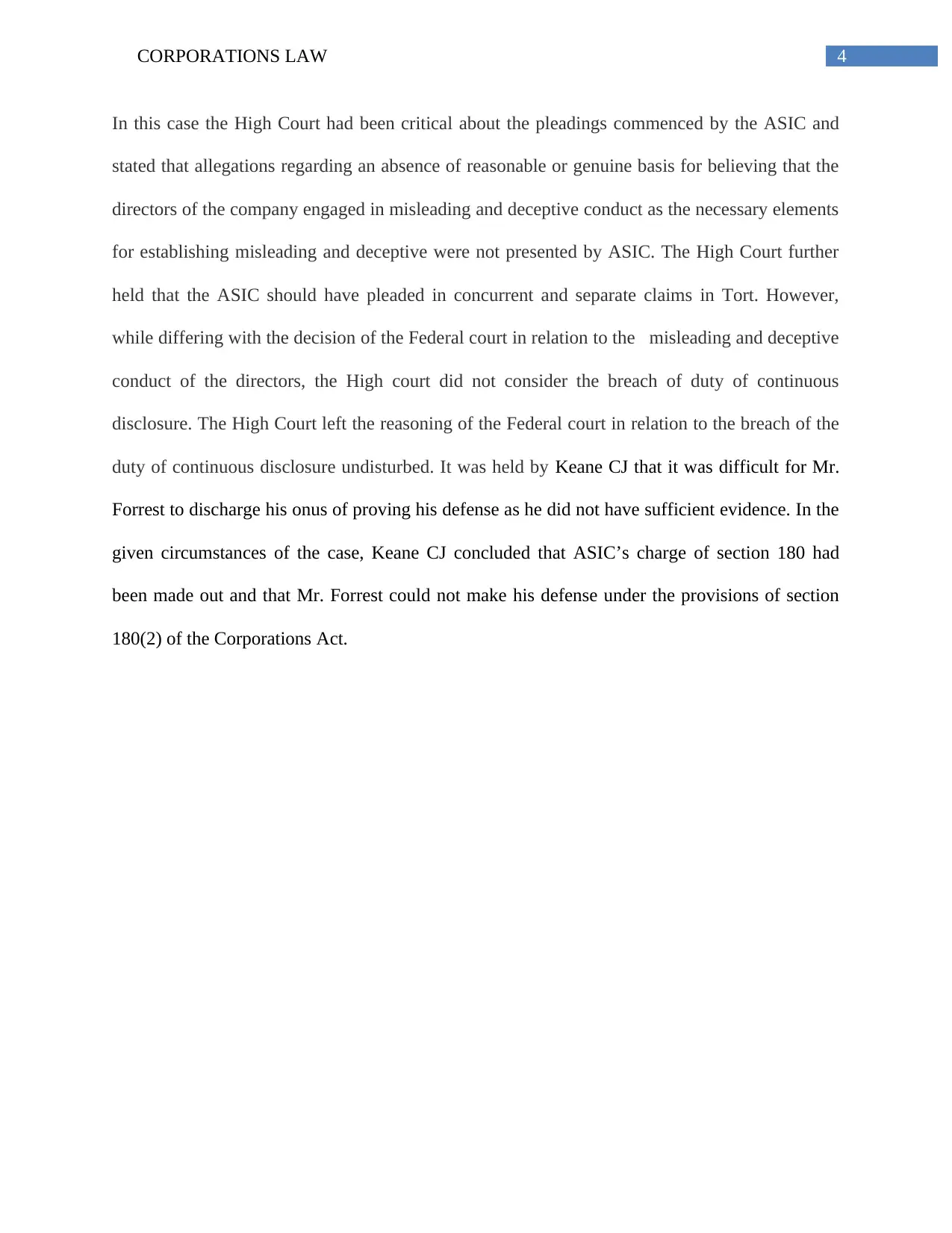
4CORPORATIONS LAW
In this case the High Court had been critical about the pleadings commenced by the ASIC and
stated that allegations regarding an absence of reasonable or genuine basis for believing that the
directors of the company engaged in misleading and deceptive conduct as the necessary elements
for establishing misleading and deceptive were not presented by ASIC. The High Court further
held that the ASIC should have pleaded in concurrent and separate claims in Tort. However,
while differing with the decision of the Federal court in relation to the misleading and deceptive
conduct of the directors, the High court did not consider the breach of duty of continuous
disclosure. The High Court left the reasoning of the Federal court in relation to the breach of the
duty of continuous disclosure undisturbed. It was held by Keane CJ that it was difficult for Mr.
Forrest to discharge his onus of proving his defense as he did not have sufficient evidence. In the
given circumstances of the case, Keane CJ concluded that ASIC’s charge of section 180 had
been made out and that Mr. Forrest could not make his defense under the provisions of section
180(2) of the Corporations Act.
In this case the High Court had been critical about the pleadings commenced by the ASIC and
stated that allegations regarding an absence of reasonable or genuine basis for believing that the
directors of the company engaged in misleading and deceptive conduct as the necessary elements
for establishing misleading and deceptive were not presented by ASIC. The High Court further
held that the ASIC should have pleaded in concurrent and separate claims in Tort. However,
while differing with the decision of the Federal court in relation to the misleading and deceptive
conduct of the directors, the High court did not consider the breach of duty of continuous
disclosure. The High Court left the reasoning of the Federal court in relation to the breach of the
duty of continuous disclosure undisturbed. It was held by Keane CJ that it was difficult for Mr.
Forrest to discharge his onus of proving his defense as he did not have sufficient evidence. In the
given circumstances of the case, Keane CJ concluded that ASIC’s charge of section 180 had
been made out and that Mr. Forrest could not make his defense under the provisions of section
180(2) of the Corporations Act.
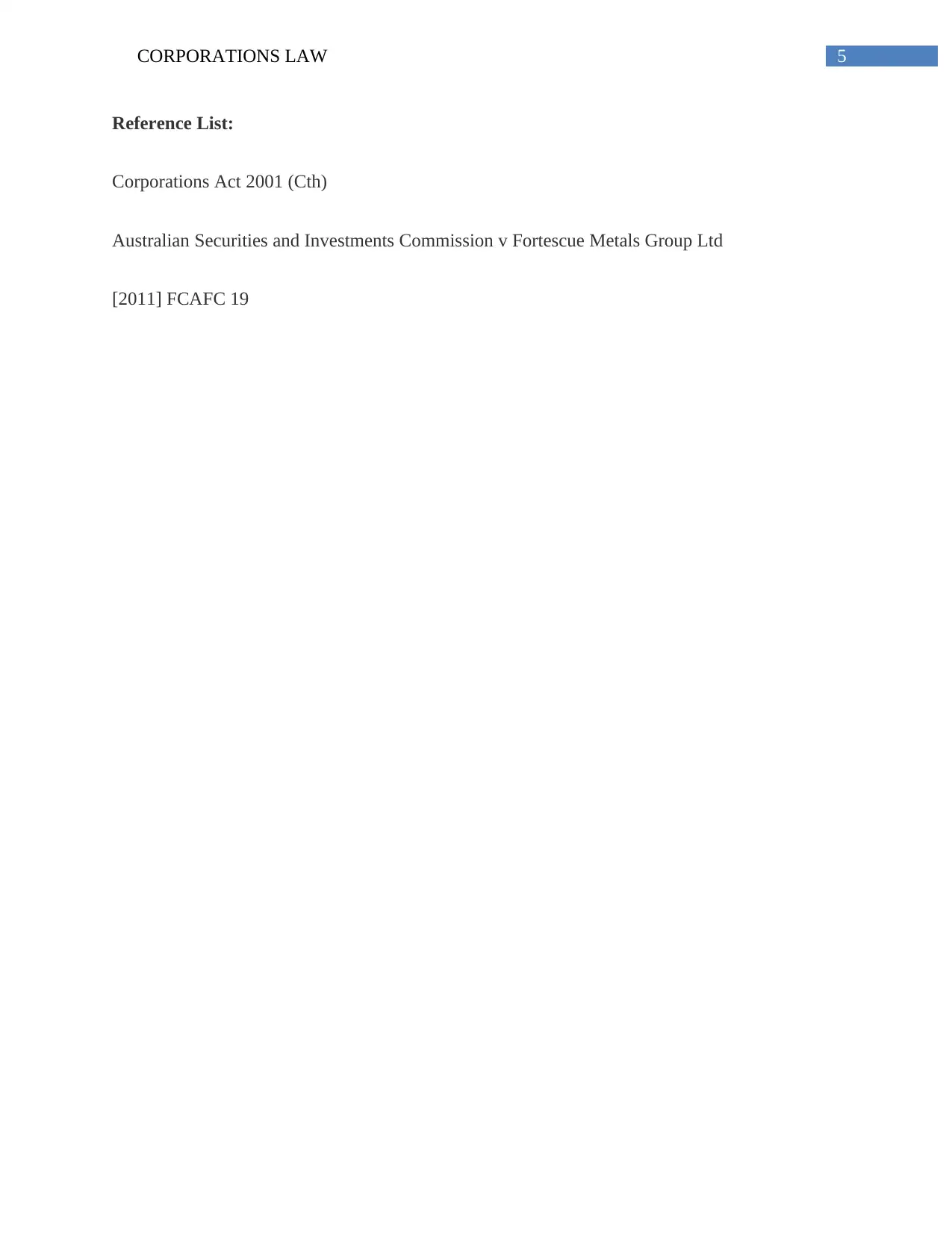
5CORPORATIONS LAW
Reference List:
Corporations Act 2001 (Cth)
Australian Securities and Investments Commission v Fortescue Metals Group Ltd
[2011] FCAFC 19
Reference List:
Corporations Act 2001 (Cth)
Australian Securities and Investments Commission v Fortescue Metals Group Ltd
[2011] FCAFC 19
⊘ This is a preview!⊘
Do you want full access?
Subscribe today to unlock all pages.

Trusted by 1+ million students worldwide
1 out of 6
Related Documents
Your All-in-One AI-Powered Toolkit for Academic Success.
+13062052269
info@desklib.com
Available 24*7 on WhatsApp / Email
![[object Object]](/_next/static/media/star-bottom.7253800d.svg)
Unlock your academic potential
Copyright © 2020–2026 A2Z Services. All Rights Reserved. Developed and managed by ZUCOL.




